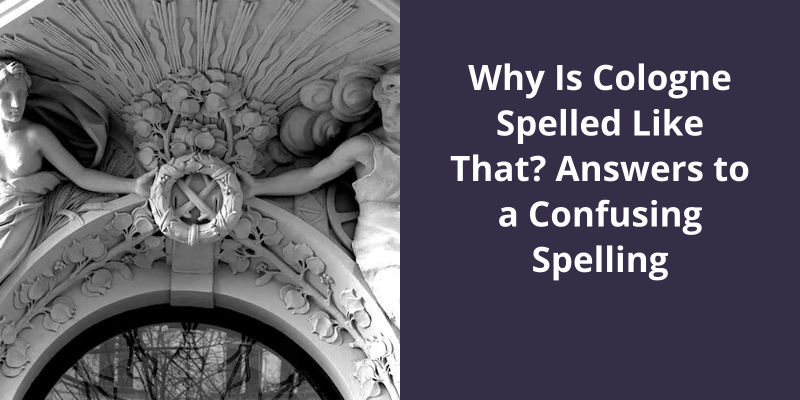Cologne gets its name from the city Cologne in Germany where it was first produced. Originally, the French word for it was “eau de cologne,” but over time, it got shortened to just “cologne” in English. All these versions actually refer to a type of light, typically citrus-based perfume that originated from Cologne, Germany. This name has stuck around even though the spelling or pronunciation might be confusing for non-native speakers. The spelling has nothing to do with its scent or ingredients but rather, it’s a geographic and historical reference. This is also why the pronunciation and spelling differ, largely due to the way different languages pronounce and spell words.

What Does the Name Cologne Mean?
The name “Cologne” is widely familiar as a city in Germany, known for it’s rich history and cultural heritage. However, the word has another connotation that’s been entrenched within the lifestyle of people all over the world. The word “cologne” is commonly associated with a fragrant liquid container, used to enhance an individuals odor and attractiveness.
The liquid is usually housed in a bottle, commonly referred to as cologne bottles. These bottles come in various shapes, sizes, and designs, each with a unique personality and style associated with it’s user.
They’re designed to provide a subtle, attractive scent that complements the users natural smell, thereby creating a unique aura and attract people to the wearer.
However, they’ve distinctions in their compositions, scent profiles, and longevity. Eau de cologne is the most common variant and has a lower concentration of essential oils compared to other perfume types. These differences make them suitable for different occasions, personalities, and preferences.
It’s grown to be a vital aspect of personal grooming, becoming an essential part of an individuals daily routine. The blends and assortments found under the category provide a wide range of options for individuals to choose from, according to their personality and preference. It’s safe to say that cologne has become an indispensable part of our everyday lives, defining a unique scent culture that’s known and appreciated worldwide.
Now that we know the origins of the term “cologne,” let’s dive into the vibrant history of the city that inspired it. From it’s ancient Roman roots to it’s prominent place in the modern world, Köln has a rich cultural heritage that’s sure to fascinate and inspire. Join us as we explore the captivating story of this historic German city.
How Did Cologne Get It’s Name?
Köln, the fourth largest city in Germany, is known for it’s rich history, stunning architecture, and vibrant culture. Located on the banks of the Rhine river, the city has been a key economic center for centuries, attracting traders and entrepreneurs from around the world. But how did the city get it’s name?
The origin of the name “Köln” can be traced back to the Roman era, when the city was known as “Colonia Claudia Ara Agrippinensium”. This long-winded title was eventually shortened to “Colonia” and then to “Köln” over the centuries. The name is thought to derive from the Latin word “colonia”, which means “colony” or “settlement”, and refers to the fact that the Romans established a military outpost in the area in 50 AD.
One of the most famous products to come out of Köln is Eau de Cologne, a perfume invented by the Italian barber Giovanni Maria Farina in the early 1700s. Farina was inspired by the scent of citrus fruits, which he encountered while living in Italy, and he created a fragrance that combined lemon, orange, bergamot, and other essential oils. The perfume was an instant hit, and soon became known as “cologne water” or “Eau de Cologne”.
Today, Eau de Cologne is still produced in Köln, and the city has become synonymous with the fragrance. Many tourists visit the city specifically to buy Eau de Cologne and other perfumes, and the fragrance is widely used by men all over the world. In addition, the city has a thriving perfume industry, with many other fragrance companies based in Köln.
From a Roman military outpost to a bustling economic center, the city has played a key role in many important events, and has given the world one of it’s most iconic fragrances. Today, Köln is a vibrant cultural hub, attracting visitors from all over the world who come to experience it’s rich heritage and unique identity.
The History of Cologne’s Architecture, Including Famous Buildings and Landmarks.
This article provides an overview of the architecture in Cologne throughout history, highlighting famous buildings and landmarks that have shaped the city’s skyline.
Source: Cologne – Wikipedia
Now that we know how Germans say Cologne, it’s interesting to note that the pronunciation can differ based on the region. Additionally, Cologne isn’t just a city, but also a region covering the hills of the Eifel and the Bergisches Land. Let’s explore more about this vibrant region and it’s attractions.
How Do Germans Say Cologne?
When it comes to the pronunciation of the city of Cologne, also known as Köln in German, it largely depends on the region and accent of the speaker. As one of the five governmental districts of the German Federal State of North Rhine-Westphalia, Cologne is situated in the southwestern part of the state and covers the hills of the Eifel as well as the Bergisches Land. The city is widely recognized for it’s impressive skyline, historical landmarks, and vibrant cultural scene.
Those from the eastern side of the country typically have a thicker and harsher accent, whereas individuals from Cologne (also known as Kölners) tend to have a softer, more fluid tone. This is particularly noticeable when listening to the German language being spoken by Kölners compared to speakers from other regions of Germany.
In general, it’s important to note that German is a highly diverse language with many regional accents and dialects. This can affect the pronunciation of words and place names in subtle yet distinct ways. This can cause some confusion for non-native speakers and visitors to the city who aren’t familiar with the local language and pronunciation customs.
Despite these variations in pronunciation, Cologne remains an important cultural and economic center of Germany. With a rich history dating back to Roman times, the city is home to many iconic landmarks including the famous Cologne Cathedral, which is considered one of the finest examples of Gothic architecture in Europe. Additionally, Cologne is also renowned for it’s vibrant arts scene and hosts a variety of festivals throughout the year, including the Cologne Carnival, one of the largest street festivals in Europe.
So if you’re traveling to Germany, make sure to add a stop in Cologne to your itinerary to experience this iconic city for yourself.
Tips for Non-Native Speakers on How to Correctly Pronounce Cologne/Köln
- Listen to natives speaking and mimic their pronunciation.
- Focus on the vowel sounds, such as the ‘o’ in Cologne that’s pronounced like the ‘e’ in ‘better’.
- Pay attention to the stress of the word. The stress in ‘Köln’ is placed on the first syllable.
- Practice the ‘ch’ sound which is pronounced differently in German than in English.
- Use online resources, such as language learning apps or YouTube videos to practice and improve your pronunciation.
- Don’t be afraid to ask native speakers for help and feedback on your pronunciation.
- Keep practicing until you feel confident with your pronunciation.
Have you ever wondered why the German city of Köln is commonly referred to as Cologne in English? It seems like a simple translation, but there’s actually a fascinating linguistic history behind it. While it may be tempting to simply respell the name to it’s phonetic spelling, there are specific reasons why this particular city’s name has evolved to it’s current form. Let’s explore the story behind “Köln” and “Cologne.”
Why Is Köln Pronounced Cologne?
Köln is the fourth largest city in Germany and is located in the western part of the country on the River Rhine. It was founded by the Romans in the 1st century AD and has a long and rich history that’s influenced it’s culture, architecture, and language. The name Köln comes from the Latin word Colonia which means colony or settlement. Over time, the spelling and pronunciation of the name changed as the language evolved.
The pronunciation of Köln as Cologne is due to the influence of the French language. The French city of Cologne was also named after the Roman colony and was a major cultural center in Europe during the Middle Ages. Many French people visited the city and spread the pronunciation of the name Cologne throughout Europe. Eventually, it became the accepted pronunciation in English as well.
The umlaut in the German language is a diacritic that changes the pronunciation of a vowel. In the case of Köln, the umlaut is used to change the o sound to an ö sound, which is closer to the original Latin pronunciation. However, in English and many other languages, the umlaut is often dropped or replaced with an e so that the name is spelled and pronounced phonetically.
Despite the differences in pronunciation and spelling between Köln and Cologne, the city remains an important cultural and economic center in Europe. It’s home to many historic landmarks, museums, and art galleries, as well as a thriving nightlife and food scene. Visitors to the city can experience the unique blend of old and new that makes Köln such a fascinating destination.
Anyone passing through Germany on their way to Cologne should be sure to get off at Köln to experience all that this magnificent city has to offer.
The History of Cologne/Köln, Including Notable Events and Figures.
- Founding of Cologne in 50 AD by the Romans
- Battle of Worringen in 1288
- Construction of the Cologne Cathedral in 1248-1880
- Bombing of Cologne during WWII in 1942-45
- Rebuilding of Cologne after WWII
- Birth of activist and writer Annemarie Schwarzenbach in Cologne in 1908
- Operatic tenor Fritz Wunderlich born in Kusel, but lived and performed in Cologne
Understanding the intricacies of language and it’s pronunciation can help one navigate through unfamiliar territories. In the case of learning German, knowing why the G is silent in Cologne can avoid confusion and embarrassment. But the G silent rule extends beyond German and can be observed in other languages as well.
Why Is the G Silent in Cologne?
Cologne is a city located in western Germany that’s famous for it’s history, culture, and stunning architecture. The city has been inhabited by people for thousands of years and has played a significant role in German history. One of the most interesting things about Cologne is the pronunciation of it’s name. Visitors to the city may be surprised to discover that the g in the word Cologne is silent.
Some linguists believe that it’s simply a matter of English pronunciation rules, while others suggest that it may have to do with the way that the word was pronounced in Old German.
For those who’re learning German as a second language, the combination of letters gn can be particularly challenging. The correct pronunciation of words like Cologne and champagne can be difficult for non-native speakers of the language to master. However, once students understand the pronunciation rules for words that end in -gne, they’ll be able to say these words with ease.
In addition to it’s interesting linguistic quirks, Cologne has many other attractions that make it a popular tourist destination. The city is home to numerous museums, art galleries, and historic sites, as well as a vibrant nightlife scene. Visitors can explore the winding streets of the old town, sample traditional German cuisine, or simply relax in one of the citys many parks.
The History and Significance of the City of Cologne in German History
Cologne is a German city with a rich history and cultural significance. It was founded by ancient Roman settlers and played a key role in the medieval period as a trading hub and religious center. Throughout history, Cologne has been a site of conflict and political power struggles, including during World War II. Today, it’s known for it’s Gothic cathedral, vibrant arts scene, and renowned museums. It’s legacy continues to shape German culture and history.
Conclusion
In conclusion, the reason why Cologne is spelled like that’s because of it’s rich history and influences from various cultures. It highlights the importance of understanding linguistic and cultural diversity in our world, and how language has evolved over time due to political and social factors. Furthermore, it underscores the need for accurate translations and proper usage of foreign words and names in order to maintain cultural sensitivity and respect.





